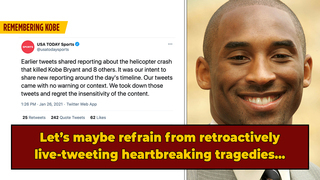USA Today Sports' Kobe Bryant Memorial Offends More Than It Commemorates

On today's episode of "who tf approved this social campaign," it seems some very misguided folks at USA Today Sports decided it would be a great idea to commemorate the one year anniversary of the death of LA Lakers legend, Kobe Bryant, by retroactively live-tweeting the fatal helicopter crash that killed the star basketball player, his 13-year-old daughter, Gianna, as well as two other children and five others. In a move seemingly inspired by former White House Press Secretary, Ari Fleischer's yearly 9/11 "live tweets," the sports publication recapped the tragic event on a minute by minute basis, including the exact content of text messages sent by those moments before the crash ...
.. as well as interactions between the pilot and air traffic control.
Yikes. Soon after, as one could easily predict, USA Today Sports faced a massive backlash for their series of graphic time-organized posts, as users criticized their editorial process ...
... noting their arguably inappropriate approach to commemorating the crash ...
... with some accusing the publication of exploiting the deaths of nine people for "clout" ...
... dubbing the coverage a textbook example of what not to do as a reporter ...
... and even calling for everyone at the outlet's sports vertical to be fired.
Seemingly in light of this backlash, USA Today Sports ultimately chose to delete the thread and later issued a statement on their Twitter account. "Earlier tweets shared reporting about the helicopter crash that killed Kobe Bryant and 8 others," the post read. "It was our intent to share new reporting around the day's timeline. Our tweets came with no warning or context. We took down those tweets and regret the insensitivity of the content."
If only it was that simple. Even with their apology and retraction, it's important to remember that it wasn't just Bryant, the public figure, that was on that aircraft -- there were young children and other adults who tragically lost their lives in the crash as well. They were students, coaches, family members, and friends. They had rich lives that were horrifically cut short. Their memories, especially those of the kids that were killed, deserve to be treated with respect, not used as a means of garnering retweets. Doing so is undoubtedly a breach of not only their dignity as individuals who once lived but of the ethics reporters -- and people in general -- should abide by. It's what we owe to each other, and more importantly, it's what we owe to the young people in our world.
This sentiment and the importance of sensitivity in this type of coverage is embodied by a post Vanessa Bryant, Kobe's widow, shared on Instagram earlier this month, imploring news outlets to remain respectful in commemorating the loss of her husband and daughter. "Dear media, please be considerate when airing or posting remembrance footage," she wrote. "We ask that you do not air photos of the wreckage, helicopter in the air or the accident scene. We do NOT want to see it. Our year has been traumatic enough. You have thousands of photos and videos you can show besides footage of 1/26/20. We hope videos of remembrance are done in a classy and tasteful manner that is respectful of all our losses."
Although it seems the outlet avoided including the aforementioned images, the graphic nature of their memorial seems to violate the broader sentiment of Vanessa's post. Compassion towards those impacted by sensitive stories is a key tenet of reporting on painful subjects, alongside truth and accuracy. The heartbreaking, sudden loss of a father, husband, and hero for millions of basketball fans, his daughter, two other children, and five adults definitely lands in that category. There is a stark difference between recalling a historically-significant national tragedy that occurred almost 20 years ago and sharing the gory, personal details of the brutal deaths of a beloved sports hero and eight others in "real-time" on the heels of a year defined by loss and heartbreak. Bryant's life and contributions to society absolutely deserve to be commemorated, however as we grapple with a deadly pandemic that has sickened more than 100 million people globally and killed more than two million, now is not the time to delve into the minutiae of lives cut short, including those of children, unnecessarily reliving gut-wrenching memories from a largely pre-pandemic world.
"Newsrooms should require staff and management to go through some kind of training on how to approach and report on traumatic events," Sports Commentator and anchorwoman for Sacramento, California's ABC affiliate, Lina Washington explained on Twitter. "Journalists are tasked with covering tragedies every day and, as demonstrated by USA Today Sports, the compassion is often lost in it. It's not ok."
Washington is right -- it's not okay. It seems that over the past year, as reporters have covered the demise of millions, sensitivity surrounding end-of-life topics has begun to dwindle, not from a place of malice or apathy, but due to death's new status as a highly-visible, core element of our daily lives. As those expected to convey the horrifying details of a global tragedy on a day-to-day basis, we must hold each other accountable, remembering that life within a pandemic is not normal, and to check in on ourselves and our colleagues as we continue embarking on this tough beat -- for the sake of the audiences we serve and the victims and their families, whose stories we've been entrusted with telling to the world.
So as we heal from the Covid-19 pandemic and Bryant's passing, let's allow this painful mistake to serve as an important reminder to continue nurturing our humanity even in these extreme circumstances. At the end of this, we are still human, and our readers are, too.
For more internet stories, follow Carly on Instagram @HuntressThompson_ and on Twitter @TennesAnyone.